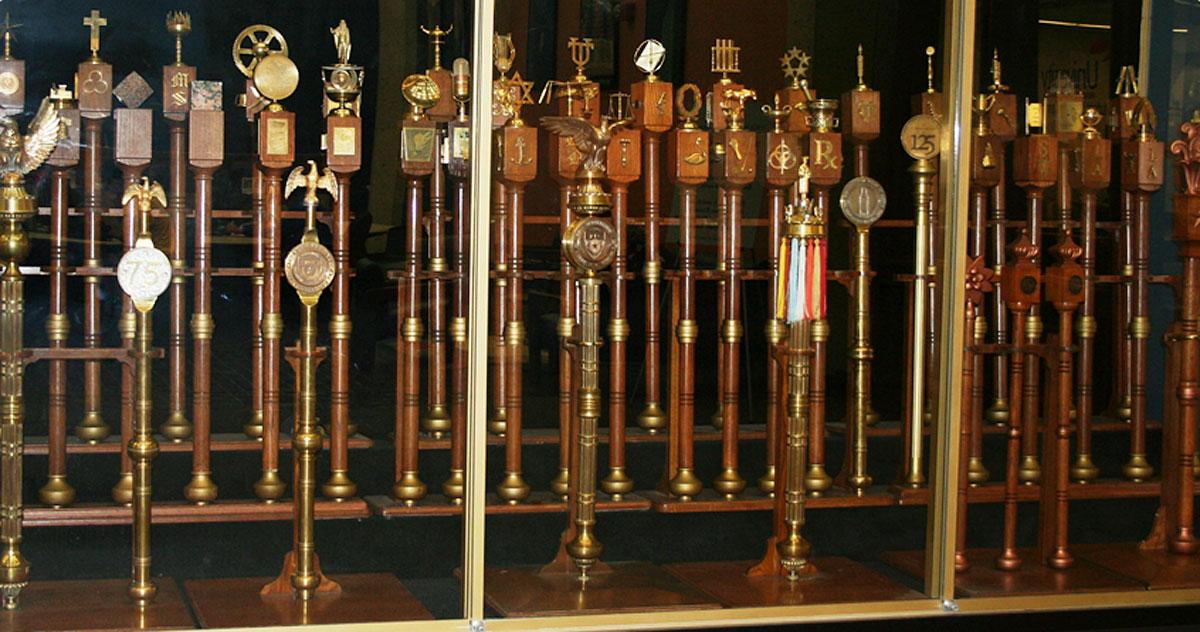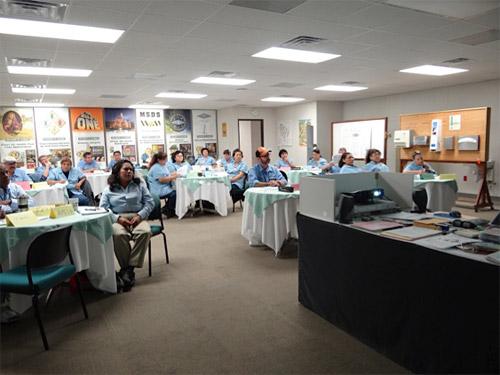We're Sustainable
Custodial Services is committed to using sustainable products and processes. Our green cleaning program is achieved through the use of a comprehensive, high-performance cleaning management system.
A Standardized Process
Custodial Services utilizes a standardized cleaning process which minimizes the amount of equipment and cleaning agents that we use on a daily basis. It includes strategically designed workloads for each team member, ergonomic equipment, and environmentally friendly materials with an emphasis on safety.
Team Cleaning
Cleaning work can be assigned either by space (zone cleaning) or by task (team cleaning). With zone cleaning, each cleaning worker is responsible for cleaning a specific area— from vacuuming to cleaning restrooms. In team cleaning, the work is divided into tasks and performed by specialists— collection specialist, vacuum specialist, utility specialist and restroom specialist. In 2001, Custodial Services transitioned from zone cleaning to team cleaning.
The functions of each type of specialist are described below:
Collection Specialist- Empty trash and recycling bins
- Clean whiteboards and blackboards
- Dust all appropriate horizontal and vertical surfaces – high and low
- Pick up paper clips, paper, pencils and other debris from floors
- Spot clean surfaces
- Spot clean wall and fixture marks and dirt
Vacuum Specialist
- Double-check that waste receptacles were emptied
- Vacuum all high traffic areas
- Spot vacuum all other areas
- Vacuum crumbs and other debris on furniture
- Reposition all furniture correctly
- Turn out lights upon completion of a room
- Secure area as required
Utility Specialist
- Clean elevators
- Spot clean and vacuum stairwells
- Clean glass surfaces
- Polish metal surfaces
- Spot clean carpet stains
- Clean first impression areas
- Clean high visibility carpet
- Pick up trash and haul to dumpster
- Restock storage areas
Restroom Specialist
- Remove debris from fixtures
- Refill consumable supplies
- Empty restroom waste receptacles
- Clean and disinfect all fixtures
- Spot clean and disinfect other restroom surfaces
- Dust all appropriate restroom surfaces
- Sweep and mop floors
- Remove mineral deposits from fixtures
Fitness Program
Custodial Services at The University of Texas at Austin does more than keep our buildings in top shape. As time goes on, many of us find it harder to stay healthy. With hectic schedules we often forget to take care of ourselves. Custodial Services has decided to focus on the well-being of our employees by taking a few minutes to prepare them physically and mentally for the start of their work day.
In the fall of 2010, Custodial Services began working with the university Kinesiology Department’s Fitness Institute of Texas (FIT) to create a program specifically for our custodial staff. Like most universities, we are fortunate to have many resources available to us to supplement our expertise in a multitude of areas. Following a few visits with the Kinesiology Department’s FIT staff we embarked on a cooperative effort to develop and implement a program aimed at reducing workplace injuries.
Development included looking at job descriptions for each function that is performed, then interviewing and observing our staff in action, and finally running some trial programs to see what did and didn’t work for our staff. The goal of the warm up program is to prepare our employees for the demands of the job and help reduce the risk of injury.
Our Award-Winning FIT Start Program:
Our program was the recipient of APPA's Effective & Innovative Practices Award. The APPA award recognizes programs and processes that enhance service delivery, lower costs, increase productivity, improve customer service, generate revenue, or otherwise benefit the educational institution.
FIT Start Videos
Keeper of the Maces
Custodial Services does more than clean. We are also responsible for the upkeep and scheduled use of The University of Texas at Austin maces. The University has a collection of ceremonial maces that are carried at official occasions of the institution, such as Commencement and Honors Day. The original three maces, the Progenitors, were crafted by Professor Carl Eckhart in the spring of 1956 using wood preserved from the original Old Main building and were used for the first time in the Commencement exercises conducted on June 2, 1956. Professor Eckhart designed and fabricated 38 maces, in addition to the three Progenitors, representing the University and the University's various schools and colleges. Professor Eckhart's 41 maces comprise the original collection. Subsequently, seven more maces have been added to the collection, bringing the current total to 48. The mace collection is kept on regular display in the Perry-Castañeda Library (PCL).
Information on Carl Eckhart
UT Commencement History and Traditions

If you are interested in learning more about the history of the maces, please read the e-booklet below:
Extensive Training and Education
Custodial Services’ Training team has been instrumental in maintaining our cleaning program and ensuring all employees receive compliance training. It is important that our custodial staff understand the environmental impacts they may have within the campus buildings. For that reason, we not only train employees how to do the work, but why we do it.
New Employee Orientation and Compliance Training
New Custodial Services employees are thoroughly trained before they begin directly serving the campus. The trainers cover compliance, employee health and safety, department orientation and cleaning processes. Hands-on training takes place in the field during the probationary period with their designated crew leader. The training team conducts regular visits to reinforce training and ensure trainees apply classroom training in the field.
Continuing Education
Our training department strives to provide ongoing training out in the field as well as in the classroom. This ongoing training provides management the opportunity to communicate expectations and benchmark successes of the training program. These retraining sessions also identify areas of education and training that need adjusting to improve service to our customers.

Need Service?
512-471-2020
facilities@austin.utexas.edu
